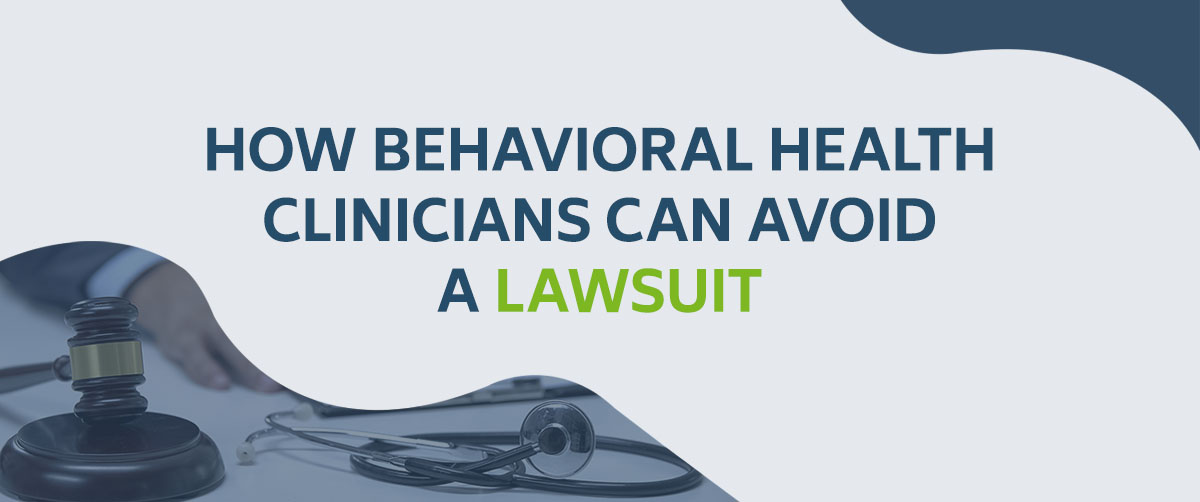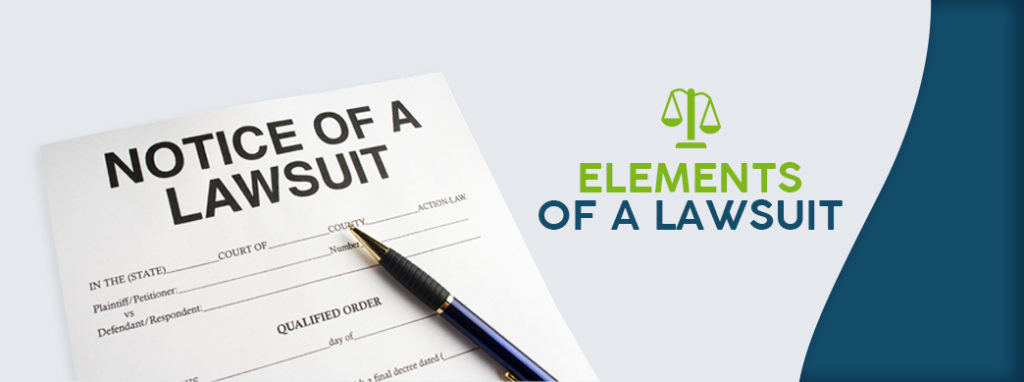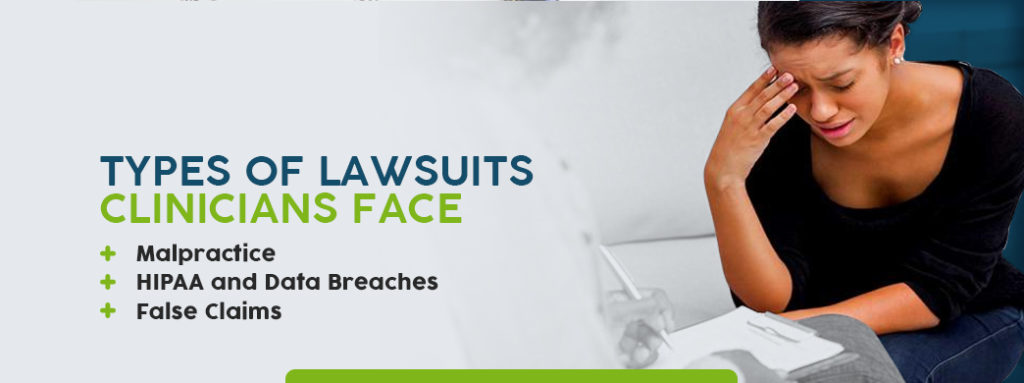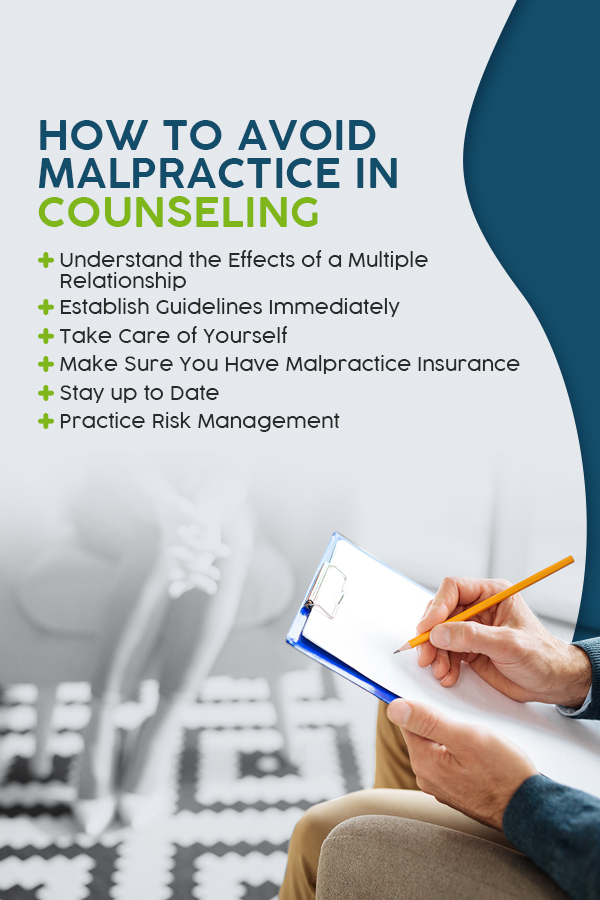How Behavioral Health Clinicians Can Avoid a Lawsuit
Most clinicians enter the behavioral health field because they are driven to help others. Psychologists, psychiatrists and other mental health professionals do not enter the field hoping they’ll face a lawsuit someday. Nevertheless, due to the nature of the job, the possibility of litigation exists. Clinicians might face a malpractice lawsuit or a privacy violation at some point throughout their careers.
Fortunately, there are ways to prevent malpractice even in complex situations. In this post, we’ll look at the types of lawsuits clinicians commonly face and ways to prevent malpractice in therapy.
Table of Contents
- The Elements of a Lawsuit
- The Types of Lawsuits Clinicians Face
- How to Avoid Malpractice in Counseling
- Importance of EHR Software for Avoiding Litigation
- How ICANotes Can Help Your Behavioral Health Practice
The Elements of a Lawsuit
Part of the mental health profession requires making patients feel comfortable opening up about their most personal concerns, thoughts and feelings. Clinicians must develop a professional relationship with their clients that is built on trust and understanding. A clinician takes on the responsibility of maintaining confidentiality and appropriate boundaries with their patients. Sometimes, this can get complicated.
For example, a depressed patient might ask to text their counselor if they have a suicidal thought. The counselor, wanting to help their patient, might agree to communicate with the patient outside of the office. This relationship could potentially develop into something inappropriate for both the counselor and the client and could lead to a malpractice lawsuit in various ways.
Generally, if a patient feels they have been violated or treated negligently, they can take several different steps. They might file a complaint with the clinician’s employer, write a bad review about the practice or speak with the clinician about the violation. Or, they might seek legal justice for the harm caused to them, in which case they may recover compensation for the damages.
A patient does not have grounds for a malpractice lawsuit simply because they feel dissatisfied with the care they received. To make a mental health malpractice claim, a patient needs to be able to establish all of the following factors:
- A patient-clinician relationship existed
- The clinician breached their duty of reasonable care
- The patient was injured mentally or physically
- The psychiatrist’s negligence caused the injury
The key to remember is that you must have acted negligently for there to be a malpractice lawsuit.
The Types of Lawsuits Clinicians Face
Common complaints clinicians face include relationship boundary issues, sexual misconduct, patient suicide or suicide attempts. Mental health professionals may also be part of a lawsuit involving breaches of patient data or confidentiality. Although there seems to be a myriad of ways to be sued as a clinician, psychiatrists and pediatricians are the least likely to be sued compared to physicians in other specialties.
Any health professional who cares for patients and handles sensitive information runs the risk of litigation, but there are many ways to protect yourself, your practice and your patients from harm. The first step to preventing malpractice in counseling or another type of lawsuit is to know what may lead to a lawsuit in the first place. Here are three types of lawsuits clinicians may face.
1. Malpractice
Medical malpractice lawsuits occur when a patient claims a doctor caused them harm by acting negligently. If a patient wins a malpractice lawsuit, they are awarded compensation for economic loss and pain and suffering. Although the risk of a malpractice lawsuit is lower for mental health clinicians than other types of physicians, the risk is still there.
According to a study published by the New England Journal of Medicine, 2.6% of physicians in psychiatry face a malpractice claim each year. A few reasons a patient might file a malpractice lawsuit include if their behavioral health clinician:
- Only documented the first suicidal risk assessment and did not document ongoing assessments:Suicidal risks should never be taken lightly, with thorough documentation of care throughout the process that shows you’ve taken risk-appropriate steps to address the problem.
- Did not evaluate the safety of the environment for a patient with suicidal behaviors: Assessing the client’s access to harmful substances or weapons can address the patient’s risk and may warrant greater protective steps.
- Did not respond to family members who called with concerns about a patient’s suicidal behaviors due to not having the patient’s consent: Suicidal behaviors can change the nature of normal healthcare processes, and when harm to the patient or their family members and friends has been indicated, providers can discuss care with them to the extent required, as determined by the provider’s best professional judgment.
- Allowed the patient to pay for services by doing housework, babysitting or other forms of payment: These favors are an unacceptable form of payment.
- Violating patient-provider boundaries: Overstepping patient boundaries can come in several forms, but sexual misconduct is one of the clearest violations to avoid. Others include forming a non-professional close friendship with a client or engaging in business transactions outside of the behavioral health practice.
- Failed to document medications that have been ordered or changed: Medication interactions and effects can cause significant harm if not properly documented and recorded, so it is critical to follow proper procedures and best practices for documentation.
- Altered patient records: For similar reasons, altering patient records is never acceptable.
- Used techniques without the right training: Therapeutic techniques require training and, in some cases, certification. Performing therapy without real training could result in considerable negative psychological effects on your clients.
- Used excessive self-disclosure: Self-disclosure can be a valuable tool in building trust and empathy between a provider and their client, but not knowing where to draw a line can result in derailing the session and taking the focus off of the client.
- Failed to write adequate notes: Proper documentation also includes session notes. While they can take many forms, notes should still follow best practices and cover everything discussed during the session.
- Made an improper diagnosis or treatment: Psychological diagnoses are well-defined and supported by clear criteria and evidence-based assessments. If these processes are not followed or inappropriate treatment is delivered contrary to the available evidence and the Diagnostic and Statistical Manual (DSM), you open yourself up to errors and improper care.
A few more ways a clinician may be found liable in a malpractice case include if they:
- Misdiagnosed a patient or failed to diagnose a patient
- Failed to provide adequate follow-up care
- Failed to recognize symptoms
These are not exhaustive lists, nor do the items on these lists guarantee a lawsuit. Again, it must be evident that you did not provide reasonable care to be held liable.
2. HIPAA and Data Breaches
Under the Health Insurance Portability and Accountability Act (HIPAA), clinicians are responsible for protecting their patients’ information. However, a patient cannot sue for a HIPAA violation in itself. Instead, they can take legal action against an entity for being negligent or breaching a privacy contract. They have to prove that their clinician did not take care to protect their information from theft or other forms of a data breach.
In the event of a HIPAA violation, a patient may file a claim with the Office for Civil Rights (OCR) first. Next, they might contact an attorney to file an individual lawsuit or take part in a class-action lawsuit if many patients were affected by the breach to recover damages caused by their data being stolen or released.
Hundreds of data breach cases are currently under investigation by the OCR, ranging from laptop theft cases to hacking incidents. Although the data breach laws vary between states, a clinician generally must protect a patient’s privacy. Mental health professionals, in particular, have to keep psychotherapy notes confidential in addition to complying with general HIPAA regulations.
Under HIPAA’s Privacy Rule, psychotherapy notes are defined as notes recorded by a mental health professional that document or analyze a conversation during a counseling session. Psychotherapy notes do not include information such as medications or treatment plans — they are the personal notes of a therapist that are usually not required for treatment.
A clinician must obtain a patient’s authorization before sharing their psychotherapy notes for any reason with another health professional. One exception to this rule is if the notes would help prevent a harmful situation or if the clinician needs to report abuse. Psychotherapy notes must be kept separate from medical records.
If a psychologist releases information without a patient’s consent, unless it is to protect the client or public from serious harm, there could be a lawsuit. If a breach would occur, covered entities, such as psychologists or psychiatrists, must comply with HIPAA’s Breach Notification Rule. This rule says that the entity must notify the affected individuals, the Department of Health and Human Services (HHS) and possibly the media. Knowingly sharing confidential information without a patient’s consent could also lead to a lawsuit.
3. False Claims
The False Claims Act states that anyone who deliberately submits false claims, such as Medicaid or Medicare claims, to the government must pay a civil penalty for each false claim if they are found liable. A false claim occurs when a clinician knowingly:
- Presents a fraudulent claim for payment or approval
- Uses or creates a false record or statement to get a claim paid
- Conspires with others to get a claim paid by the government
- Conceals an obligation to pay money to the government
Physicians must also report and return Medicare overpayments to the government 60 days after the overpayment was identified. Usually, patients are not the ones to report false claims. An employee, former employee or a competitor may inform the government about false claims.
One example of a false claims lawsuit involving a behavioral health clinician was the case of Dr. Erum Shahab. Shahab, a psychiatrist and owner of a psychiatric medical practice in Connecticut, regularly conducted urine drug screening tests on patients being treated for substance abuse disorder. Shahab submitted claims to Medicare for multiple units of urine drug screening even though only one unit of service could be billed per patient encounter.
Shabab’s practice received hundreds of thousands of dollars from the Medicare program as a result. To resolve allegations of violating the False Claims Act, Shahab and his practice agreed to pay the government over $800,000 — the amount needed to cover the false claims.
How to Avoid Malpractice in Counseling
Most clinicians want to avoid a malpractice lawsuit at all costs. When a patient sues their doctor, the physician may undergo extreme stress. A clinician facing a lawsuit may first experience a sense of shock, followed by anxiety, anger and dread. According to the Western Journal of Medicine, more than 95% of physicians experience emotional distress during the litigation process.
If found guilty of malpractice, a clinician could lose their license. Here are six ways to prevent negligence and malpractice in therapy.
1. Understand the Effects of a Multiple Relationship
A multiple relationship describes a clinician who fulfills several roles for a patient. In other words, they are a professional health care provider, as well as a friend outside of the office, or maybe an employer. A counselor or clinician is also considered to have a multiple relationship with a client if they promise to enter another relationship with the person in the future.
A multiple relationship is not necessarily grounds for a malpractice lawsuit. However, if the relationship impairs the clinician’s objectivity or effectiveness as a professional — or if the relationship causes the patient harm — it could lead to a lawsuit. If a clinician realizes a multiple relationship exists, they may take reasonable steps to end the relationship keeping their patient’s health in mind.
As a mental health professional, it’s important to consider the effects of a multiple relationship and how it may impair objectivity before fulfilling more than one role for a patient.
2. Establish Guidelines Immediately
The first time you meet with a patient, make sure you set boundaries from the start. Let them know what they can expect of your services and what you will and won’t do.
For example, a patient might expect to contact you via social media when they experience a difficult situation. However, by agreeing to this, you make yourself vulnerable to a privacy violation. You have no way to know for sure you’re speaking to your client through social media or texting. Set clear communication rules and make sure your client understands them and their purpose.
3. Take Care of Yourself
Mental health professionals face a lot of stress with the job. If you’re experiencing life stressors in addition to your workload, you may feel overwhelmed and not act according to your best judgment. This may lead to inaccurate documentation or sharing too much personal information with a patient.
To prevent mistakes resulting from stress or burnout, learn to recognize when you need a break and prioritize self-care. Here are a few self-care tips for clinicians:
- Take time for yourself to do activities you enjoy, whether that’s spending time with family or meditating.
- Take care of yourself physically by getting enough sleep, eating healthy and exercising.
- Learn when to say no and allow yourself to put your health first.
4. Make Sure You Have Malpractice Insurance
Medical malpractice insurance covers liability resulting from a medical malpractice lawsuit. As a clinician or mental health professional, it’s recommended to have coverage for yourself, your business and your employees. Malpractice insurance covers expenses relating to defending and settling malpractice lawsuits and pays for damages if you are found liable.
While the vast majority of therapists and counselors do what they can to help their clients, those providers are still human beings who can make mistakes. They may have a high caseload or external stressors that affect their ability to care for clients in the right way. Even if a practice is run to the letter, clients can still sue, even if it’s for a seemingly unnecessary reason — these accusations take time and money to sort out. That is where malpractice insurance comes in.
The insurance may cover:
- Attorney fees
- Court costs
- Settlement costs
- Medical damages
- Punitive costs
Insurance can also provide added benefits to a practice through peace of mind and expert assistance. Insurance providers can help you avoid the financial distress of lawsuits, and you can rest assured that you will have the support of skilled professionals if it’s needed. Often, they can also help you with licensing board complaints.
Costs can vary based on several factors, such as the amount of coverage needed, your years of experience and the risk associated with your patients. For example, a therapist working with patients with violent tendencies is likely associated with more risk.
Malpractice insurance does not cover liability from sexual misconduct or criminal acts.
5. Stay up to Date
Staying current on the newest laws and information about malpractice risks, license requirements and patient care will help prevent psychiatric malpractice. Research psychological associations in your state and consider becoming a member. As a member, you may also receive guidance on malpractice issues and the latest information about the assessment and treatment of patients at risk of suicide.
6. Practice Risk Management
Patient suicide or a suicide attempt is one of the most common causes of a malpractice lawsuit. Here are a few ways to reduce liability relating to patient suicide or suicide attempts:
- Gather and analyze information to form an adequate suicide risk assessment and treatment plan.
- Review the patient’s past treatment records and information as part of the assessment.
- Stay current about conditions, medications and treatment.
- Communicate with the patient, staff and the patient’s support system about treatment planning.
- Educate the patient about suicide and how to identify risk factors.
- Carefully document suicide risk assessments to improve patient care and demonstrate your reasonable judgment.
Importance of EHR Software for Avoiding Litigation
Documentation is the primary evidence used in a malpractice trial. Therefore, it’s imperative to prioritize complete, accurate documentation. If a patient files a lawsuit, documentation may prevent the case from proceeding. Your records can be used to prove that you provided reasonable care and made careful judgments when treating your patient.
Electronic health record (EHR) software is one way to ensure your documentation is legible, accessible and secure. Other benefits of EHR software include that it:
- Provides easy access to patient records to help determine suicide risk and prevent suicide
- Offers more security than paper documents when sharing data with other clinicians in coordinating patient care
- Helps clinicians diagnose patients more effectively
- Increases convenience for both clinicians and patients
- Enables safer and more reliable prescribing
- Allows for legible and accurate documentation
- Enhances the security and privacy of patient data
- Improves work-life balance to reduce burnout
It’s crucial that EHR software is easy to use, highly secure and intuitive. To make the most out of EHR software in your practice, follow these six tips:
- Properly train your staff to use EHR.
- Hold regular meetings to discuss issues and solutions related to EHR.
- Take your time when entering information and always review data such as patient name, medication and follow-up appointments before finalizing.
- Avoid cutting and pasting information — treat every appointment as its own record.
- Do not share your password with anyone, and update it frequently.
- Ensure you understand policies, procedures and EHR capabilities to prevent system fraud.
How ICANotes Can Help Your Behavioral Health Practice
Clinicians want to provide the best care possible for their patients, and they also want to avoid a lawsuit. ICANotes can help ensure your documentation accurately represents your thoughtful, reasonable care and makes it easy to prioritize complete documentation.
ICANotes is behavioral health EHR software with a user-friendly interface designed to reduce documentation errors and simplify access to patient history. With ICANotes, you can easily review a patient’s treatment plan, mental health history, medications and more before they arrive. ICANotes also helps you maintain compliance with HIPAA regulations and takes the worry out of confidentiality rules.
To learn more, watch a live demo or view our webinar, “How Behavioral Health Clinicians Can Avoid a Lawsuit,” below.
Related Posts
Protect Your Practice by Performing a Security Risk Analysis
The Differences Between Psychotherapy Notes and Progress Notes
Improved Mental Health Parity Compliance and Your Practice
Enforcing the Law and Caring for Mental Health
Sources:
- https://www.psychologytoday.com/us/blog/so-sue-me/201506/when-sue-your-psychiatrist-malpractice
- https://www.apa.org/monitor/2016/03/malpractice
- https://www.ama-assn.org/sites/ama-assn.org/files/corp/media-browser/public/government/advocacy/policy-research-perspective-medical-liability-claim-frequency.pdf
- https://www.ncbi.nlm.nih.gov/pmc/articles/PMC2628513/
- https://www.nejm.org/doi/full/10.1056/nejmsa1012370
- https://ct.counseling.org/2019/01/counselor-self-disclosure-encouragement-or-impediment-to-client-growth/
- https://staging.icanotes.com/online-guides/master-class-everything-therapists-need-to-know-about-creating-insurance-and-progress-notes-to-maximize-reimbursement-rates/chapter-3-types-of-notes-therapists-use-and-what-therapists-should-include-in-their-notes/
- https://www.abpla.org/what-is-malpractice
- https://www.hipaajournal.com/sue-for-hipaa-violation/
- https://ocrportal.hhs.gov/ocr/breach/breach_report.jsf
- https://www.hhs.gov/sites/default/files/hipaa-privacy-rule-and-sharing-info-related-to-mental-health.pdf
- https://staging.icanotes.com/2018/06/08/the-differences-between-psychotherapy-notes-and-progress-notes/
- https://www.hhs.gov/hipaa/for-professionals/breach-notification/index.html
- https://www.justice.gov/sites/default/files/civil/legacy/2011/04/22/C-FRAUDS_FCA_Primer.pdf
- https://www.federalregister.gov/documents/2016/02/12/2016-02789/medicare-program-reporting-and-returning-of-overpayments
- https://www.uspsoig.gov/sites/default/files/document-library-files/2018/DOJ_NEWS_05-15-18.pdf
- https://www.ncbi.nlm.nih.gov/pmc/articles/PMC1071237/
- https://www.apa.org/monitor/jan04/ethics
- https://psychcentral.com/lib/how-clinicians-practice-self-care-9-tips-for-readers#1
- https://www.iii.org/article/understanding-medical-malpractice-insurance
- https://www.ncbi.nlm.nih.gov/pmc/articles/PMC3074199/
- https://www.psychiatrictimes.com/view/lessons-litigation
- https://staging.icanotes.com/2018/12/07/features-to-look-for-in-a-mental-health-ehr-software/
- https://www.healthit.gov/faq/what-are-advantages-electronic-health-records
- https://www.npjournal.org/article/S1555-4155(16)30510-4/fulltext
- https://staging.icanotes.com/2019/12/23/how-to-train-your-staff-on-using-an-ehr/
- https://icanotes.as.me/demos
Last updated 8/3/21





